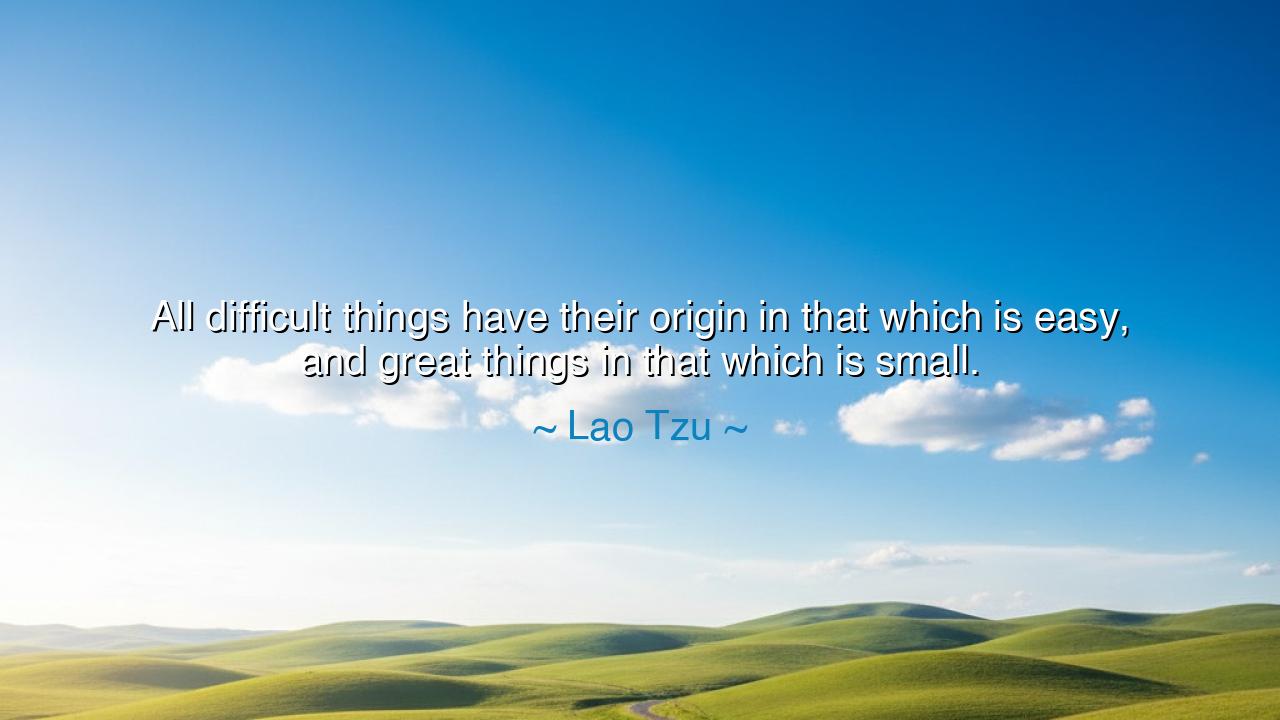
All difficult things have their origin in that which is easy, and
All difficult things have their origin in that which is easy, and great things in that which is small.






“All difficult things have their origin in that which is easy, and great things in that which is small.” — Lao Tzu
From the quiet mountains of ancient China, Lao Tzu, the sage of the Tao, spoke these immortal words—soft as a whisper, yet vast as the heavens. His teaching is a river of truth that has flowed through centuries: that greatness begins in simplicity, and that all things mighty arise first as fragile beginnings. When he said, “All difficult things have their origin in that which is easy, and great things in that which is small,” he was not merely offering a proverb for patience—he was revealing the secret rhythm of the universe.
In the Tao Te Ching, from which this wisdom springs, Lao Tzu teaches that the way of life—the Tao—is not found in striving or force, but in harmony with the natural unfolding of things. The mountain begins as dust. The river begins as a trickle. The wise do not despise small beginnings, for they see the pattern of greatness already hidden within. To them, the humble seed carries the strength of the forest, and the gentle word holds the power to change the world. Every difficult thing—every masterpiece, invention, or act of courage—was once something simple and within reach.
Think of Thomas Edison, who brought light to the world. His triumph was not born in brilliance alone, but in thousands of small attempts, each one humble, each one seemingly insignificant. He failed, adjusted, and tried again. What began as a small idea—a fragile spark—became a revolution that shaped modern life. Or think of Mother Teresa, who began her mission by tending to a single dying man in the streets of Calcutta. From that small act of compassion, her work grew into a movement that touched millions of souls. These are the living echoes of Lao Tzu’s wisdom: that the great is always hidden within the small, and that to honor the small is to open the gate to the eternal.
The ancients understood this law not only in life but in nature. A mighty oak grows from an acorn no larger than a fingertip. The roaring ocean begins with a single drop of rain. The journey of a thousand miles, as Lao Tzu also said, begins with a single step. Therefore, the wise man does not rush, nor does he scorn small efforts. He knows that greatness is not a leap but a progression, each step building upon the last, each simple act preparing the way for the next. Patience and humility are the companions of creation.
But there is another layer to Lao Tzu’s teaching—one that speaks not only to action but to the heart. Difficulties in life often appear insurmountable when we face them as a whole. Yet, if we return to the small, the simple, the first, they begin to yield. The mountain is climbed not by leaping to the peak, but by placing one steady foot upon another. The broken heart is healed not in a moment, but in small kindnesses, quiet forgiveness, and the gentle return to peace. Thus, the great tasks of the spirit—wisdom, courage, compassion—begin as small, daily choices.
Let this be the lesson to all who would achieve or endure: do not despise the beginning, nor be discouraged by the scale of your dreams. Every master was once a beginner. Every great work was once a thought, every symphony a single note. The greatness you seek is already within your reach—it hides in your habits, your thoughts, your first steps. To take that first step with care, to do the easy thing with excellence, is to prepare the way for the impossible.
So, my child of the modern age, remember the rhythm of the Tao. When the world overwhelms you with the weight of what must be done, return to the small, the simple, the next right thing. Be faithful in what is easy, and you will master what is hard. Nurture what is small, and you will one day behold what is great. This is the eternal law of life—the quiet, unfolding power of creation.
For in the end, all greatness is but the accumulation of many small acts done with love and persistence. And all wisdom, as Lao Tzu knew, is found not in conquering the vast, but in mastering the moment before you.






AAdministratorAdministrator
Welcome, honored guests. Please leave a comment, we will respond soon